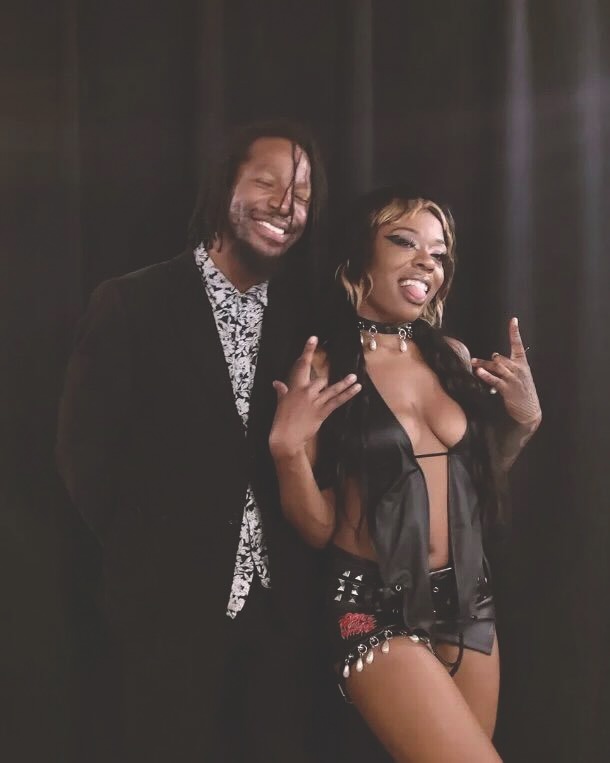Class of 2010’s Kafari joins André 3000s ‘New Blue Sun’ tour
September 13, 2024
 Courtesy of Kafari
Courtesy of KafariIn August, Grammy-winning musician André 3000 announced the opener for the first leg of his “New Blue Sun” tour this fall—the Los Angeles-based avant garde violinist, singer, songwriter and producer Sudan Archives, whose recent albums “Natural Brown Prom Queen” and “Athena” have generated a buzz from fans and critics alike.
But Sudan won’t be performing her opening sets alone: She’ll be joined onstage by Kafari—the musical alias of pianist, beat maker and rhythm bonesman Ahmad Muhammad ’10—who briefly returned to the College as the director of Jazz Ensembles for the 2021-2022 academic year.
Kafari, a Portland-based professional musician, has plenty of experience playing on the road, both as a solo artist and during his ten-year stint with the J Dilla-inspired electronic soul group Jaw Gems. But he emphasized that he sees the upcoming tour—which will include stops in ten cities, such as New Orleans, Dallas and Los Angeles—as unique to his career.
“There are so many reasons why this tour is special,” Kafari said. “I think first and foremost, the return of André 3000 … personally, he’s one of my favorite rappers ever, and his whole process of rediscovering his creativity has been so inspiring to witness.”
Kafari’s trajectory as an artist has followed a similar path of continual rediscovery and engagement with creativity. Growing up in Cincinnati, Ohio, he focused primarily on classical piano—in part due to his mother’s love of classical music—before attending his first jazz performance at 16 years old and quickly falling in love with the genre.
As a student at the College, Kafari continued to follow his passion for jazz and improvisation. He took part in a Jazz Ensemble each semester and grew increasingly interested in the connections between jazz, hip-hop and funk.
Kafari’s music evolved again when he returned to Cincinnati from 2012 to 2014. Without any previous collaborators around, Kafari dove headfirst into making beats on his computer, which drove him in new directions as an artist in unexpected ways.
“I became obsessed with that art form and really just became a machine with making beats and studying beat making, but also thinking about how I would use my skills as a piano player and my knowledge of synthesizers to bring to that passion,” Kafari said. “It really challenged my identity.”
As he entered the community of beat makers and producers in Cincinnati, Kafari began to help run a series of open events for DIY beat makers. At one of these events, he was first introduced to Sudan Archives—a Cincinnati native herself.
“Different beat makers in the Cincinnati community would perform to start it off, and then we would open it up to anyone who wanted to play their beats,” Kafari said. “One night, Sudan came and performed for us. She played violin over her beats and just completely blew us away.”
Shortly after the two met, Sudan Archives moved to Los Angeles and Kafari returned to Maine. But they stayed in touch over the years, frequently sharing new work with each other.
“Our dynamic as collaborators has always just been very, very inspiring and very, very natural and organic. And what I’m really excited about within this tour is actually being able to play together,” Kafari said. “I’ll be playing keyboard and rhythm bones on the tour too.”
The rhythm bones, a traditionally Black instrument that was appropriated by white culture through its use in minstrel shows, is the latest addition to Kafari’s musical repertoire. After he learned their history at a Carolina Chocolate Drops show in 2014, he became fascinated with the instrument.
This attention to the history of race and power within music—which Kafari exhibited during a 2017 TedX talk—also speaks to his approach as an educator. One of his primary reasons for returning to the College in 2021 was to create an inclusive jazz space.
“I think that there’s often [a need] to address topics of identity and race and class and gender and to incorporate that in our work together,” Kafari said. “I think that when people feel safe and they feel when they feel like there’s a deep culture of that—that unlocks their creativity.”
Maggie Broaddus ’25 and Alex Washburn ’25, two of Kafari’s students in Jazz Ensembles in 2021 and 2022, said that Kafari offered a kind of musical instruction that was refreshingly different from their high school experiences.
“I played a lot of jazz in high school, and that was an interesting scene, playing in New York City with a lot of men, white men.… And then I came to Bowdoin and was in a much more diverse combo led by Kafari,” Broaddus said. “A lot of jazz is confidence, and when you’re in spaces like [Kafari’s], that’s way easier to do.”

Comments
Before submitting a comment, please review our comment policy. Some key points from the policy: